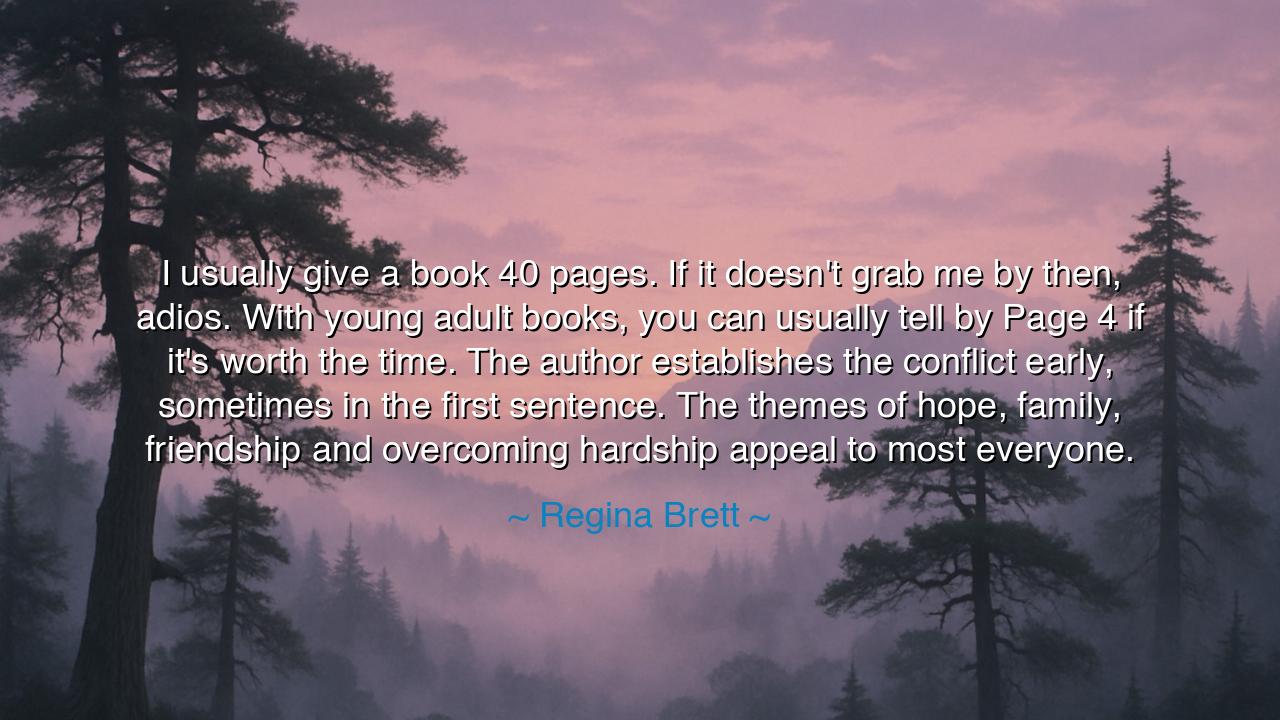
I usually give a book 40 pages. If it doesn't grab me by then
I usually give a book 40 pages. If it doesn't grab me by then, adios. With young adult books, you can usually tell by Page 4 if it's worth the time. The author establishes the conflict early, sometimes in the first sentence. The themes of hope, family, friendship and overcoming hardship appeal to most everyone.






“I usually give a book 40 pages. If it doesn’t grab me by then, adios. With young adult books, you can usually tell by Page 4 if it’s worth the time. The author establishes the conflict early, sometimes in the first sentence. The themes of hope, family, friendship and overcoming hardship appeal to most everyone.” Thus speaks Regina Brett, a writer of deep observation and gentle wisdom. In her words lies not only a reflection on reading, but on life itself—on discernment, on the power of story, and on the enduring themes that move the human heart. She reminds us that a true story, like a true life, declares its essence early. It does not hide behind pretense; it opens itself with courage, with clarity, and with conviction.
The origin of this quote arises from Brett’s lifelong devotion to storytelling and her belief that books mirror the soul of humanity. As an essayist and teacher, she knows that every story—whether written or lived—must find its conflict, the moment where the soul meets its trial. In speaking of forty pages, she is not only setting a rule for reading, but offering a metaphor for attention: that one must learn when to persist and when to let go. Life, like literature, requires judgment. Some paths will never lead to meaning; some journeys, though short, reveal the heart of truth in but a few lines.
Her praise of young adult books is not trivial—it is profound. For such stories often carry the most universal truths in the simplest forms. They do not waste time on ornament or disguise. Within the first breath, they tell us what is at stake: hope, family, friendship, and the struggle against hardship. These are the ancient pillars of every tale that has ever mattered, from Homer’s Odyssey to the humble novels of the present day. The young adult story, in its clarity, reminds us of what older hearts too often forget—that all wisdom begins in innocence, and all endurance in hope.
Consider the story of Anne Frank, whose diary, written by a young girl in hiding, speaks more powerfully than volumes of philosophy. In her first pages, she revealed the conflict—the shadow of persecution, the weight of confinement—and yet, in that darkness, she offered radiant hope. Her words were simple, yet immortal: “In spite of everything, I still believe that people are really good at heart.” She, too, was a young author who knew instinctively what Regina Brett describes—that the truth of a story must be declared early, and that hope and hardship are the twin fires that forge the human spirit.
In this way, Brett’s reflection reaches beyond books and becomes a philosophy for living. Each life, too, has its first chapters, its moments of revelation where character is made known. Some people drift for years, waiting for meaning to find them; others, like great writers, establish their purpose early, living with clarity and direction. To live well is to live like a story worth reading—to meet conflict with courage, to cherish family as the foundation of strength, to nurture friendship as the sanctuary of the soul, and to face hardship as the forge of greatness.
Her words also teach us discernment. Not every story deserves the whole of our attention. There are books—and people, and paths—that promise much but offer little. To say “adios” when the spirit feels unmoved is not cynicism, but wisdom. It is the art of guarding one’s time and devoting it only to what is true, good, and beautiful. In life, as in reading, one must recognize when a thing no longer serves the heart’s growth and have the courage to set it down. Yet when a story does call to you—when it stirs that ancient pulse of recognition—hold fast to it, for such connections are rare and sacred.
Let this be the lesson: read life as you would read a great book. Be attentive to its early signs. Listen for its conflict, seek out its hope. Surround yourself with those whose stories are rich in kindness, loyalty, and light. Be willing to turn away from what is hollow, but never from what is human. And in all your journeys—whether through pages or years—remember that what endures is not brilliance, nor fame, but the quiet strength found in hope, family, friendship, and the overcoming of hardship.
For in the end, Regina Brett’s words echo the wisdom of the ancients: that all true art and all true living begin with a clear heart and a noble purpose. Let your story, too, begin boldly. Let your life declare its meaning in its very first lines. And may every page that follows be worthy of the soul that writes it.






AAdministratorAdministrator
Welcome, honored guests. Please leave a comment, we will respond soon